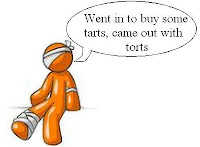Tort is basically a word for “wrong” in French. It is a wrong involving a breach of a civil duty towards the public. The 2 elements of a tort are (i) the act, i.e. the physical element which usually compromises of Defamation, Injury Nuisance, Fraud, Trespassing, Misuse of Personal Information, etc and (ii) The mind, i.e. the mental element which is generally an ill intention or negligence.
Retort: In litigation, it is always necessary to put yourself in the shoes of the defending counsel. In a case of torts the defendant’s pleas usually involve inter alia contributory negligence, consent, plaintiff’s default, necessity & private defense, inevitable accident (Act of God), authorization & limitation. Therefore, one must anticipate all these pleas and be prepared with arguments that eliminate all the above pleas.
Remedies:
1) Damages: Damages are granted in an attempt to put the aggrieved under the same financial position as he would be if the tort had not taken place. It is hard to compute this amount as one has to take into account not only the aggrieved party’s current status but future rises and falls as well. Damages are a ‘matter of right in tort law’. Unliquidated damages are important in cases of tort law. If there is no action for damages then it is not a tort. Types of approaches which the courts employ while granting damages are:-
(a)Aggravated and exemplary damages: Generally granted when the tort is outrageous in nature. Sometimes the judges sympathize with the defendant but since he is at fault and if the damage done is small only nominal damages need to be given. The reason for this is that the Court does not want to legalize the defendant’s actions by letting him go scot-free. This way, the court has favoured the aggrieved, but has also shown it’s own intentions. This approach has been approved by the Supreme Court of India as well.
(b) Parasitic de-impairment: Here, damages are not granted only for losses occurred directly by the tort. For example, if a woman burns her face while working in a plant, she can along with other damages also claim additional damages claiming that because of her current condition her relation with her husband has been forever effected.
(c) Special damages: These are harder to compute. Here, damages are granted for all other losses that may be suffered in the future e.g. Loss of future earnings
(d) Contemptuous & nominal damages: The court sometimes grants the aggrieved ‘the smallest coin of the realm’ i.e. a purely nominal sum such as Rs. 1.
2) Injunction: Injunction is a court order that requires a party to do or refrain from doing specific acts. Injunctions are ‘a matter of discretion’ in tort law. Provisions for permanent injunction are found in Sections 38-42 of the Specific Relief Act in India. It is granted to prevent a party from following a wrongful course or conduct. Example:
· Interference with possession and business
· Enforcement of bank guarantees.
· Legal recovery of taxes
· In case of private reputation v./s. freedom of press
_______________________________________________________
Also see the article Tortious Liability in the Case of Misuse of Personal Information
Keywords:Aggravated and exemplary damages, basics of tort law, injunction torts, law of torts in India, reputation freedom of press, specific relief act, tort law, torts food, defamation, Misuse of Personal Information in torts, law memes

0 comments:
Post a Comment